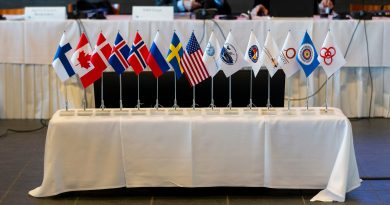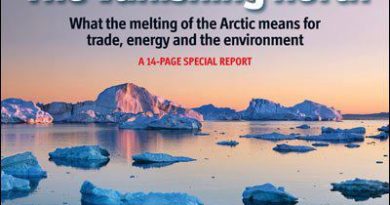The Need for a Regional Seas Agreement in the Arctic
The catastrophic spill in the Gulf of Mexico this Spring has highlighted the many risks involved in offshore oil drilling, and caused more than a few governments to reevaluate their regulations and requirements for drilling in the Arctic. This is a good thing – the environment and northerners themselves will benefit from strengthened national regulation. But it must be obvious now, if it wasn’t before, that a regional seas agreement dealing with common environmental and economic issues is needed; the circumpolar region is a pretty tight neighbourhood, and a spill in one corner would invariably affect the others.
For some time now there has been debate about what shape regional governance in the Arctic should take. The Arctic Council has done a good job since its inception in 1996 in catalyzing dialogue, supporting indigenous participation and conducting scientific assessments. But it has no legal teeth. Its relations are based on ‘soft’ law: there is no permanent secretariat, no regular financial contributions, and no legally binding framework or constitution. In fact, the only legal treaty specific to the Arctic is the 1973 Agreement on the Conservation of Polar Bears (incidentally, between the Arctic 5.)
The Arctic states, as was made clear in the Ilulissat Declaration, view the existing legal framework as sufficient, based primarily on the accession of Canada, Russia, Norway and Denmark to the UN Convention on the Law of the Sea. (The US has not yet ratified UNCLOS, but that is a detail that has conveniently been swept under the rug.) UNCLOS is wide ranging in its regulation of activities, rights and responsibilities in the world’s oceans and seas. It even has a specific clause – Article 234 – that allows states to impose higher standards for environmental protection in ice-covered waters, as Canada does. But UNCLOS is very broad, intended as it was to cover the entire globe, and is not up to the task of dealing with the many specific issues and challenges faced in the Arctic. It is precisely for this reason that it recommends states adopt regional agreements to protect their common waters.
In 2008, the WWF issued a report outlining the need for a regional seas agreement in the Arctic. Among other things, such an agreement could facilitate the management of shipping, fisheries, oil and gas activity, and the development of protected areas. Studies show that oceans management is rarely successful when addressed in a piecemeal approach; the Regional Seas Programme has the advantage of taking a comprehensive, ecosystem-based approach. However the idea has mostly languished, apparently seen as too liberal, left-wing, or just plain politically unviable.
But it’s not. Today, more than 140 countries participate in 13 Regional Seas programmes established under the auspices of the UN Environment Programme, including the Black Sea, Wider Caribbean, Mediterranean, Red Sea and Gulf of Aden. A regional seas agreement isn’t the radical environmentalist choice; it’s what responsible governments intent on safeguarding their marine interests do. As for being politically unviable, now is actually the best time to implement a regional seas agreement in the Arctic because there isn’t a lot going on just yet, and therefore not a lot of interests to balance. If the countries of the Mediterranean can establish a programme, with all of their history and heavy use of that Sea, surely the countries of the Arctic, among the wealthiest and most developed, can do so? We’re not talking about dividing up Jerusalem here! For once, it would be nice to have the foresight to develop a coherent plan of action before an emergency dictates that one be drawn up.
Canada adopts its two year chairmanship of the Arctic Council in 2013. That gives us a five year window by which to plan, negotiate, and gather political will for a regional seas agreement. Such an agreement would be a huge coup, both politically and environmentally, and help support the sustainable development of the North. Successive Canadian governments have made a big show of demonstrating their willingness to militarily defend the Arctic. It’s time to defend it against the much bigger environmental threats. A regional seas agreement would be just as impressive to voters, with an added bonus: it would actually be productive.


